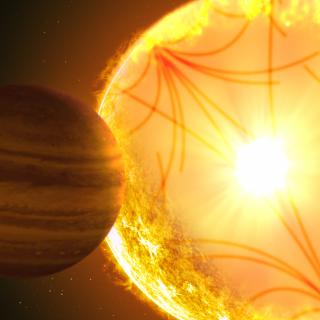Bibcode
Appourchaux, T.; Michel, E.; Auvergne, M.; Baglin, A.; Toutain, T.; Baudin, F.; Benomar, O.; Chaplin, W. J.; Deheuvels, S.; Samadi, R.; Verner, G. A.; Boumier, P.; García, R. A.; Mosser, B.; Hulot, J.-C.; Ballot, J.; Barban, C.; Elsworth, Y.; Jiménez-Reyes, S. J.; Kjeldsen, H.; Régulo, C.; Roxburgh, I. W.
Bibliographical reference
Astronomy and Astrophysics, Volume 488, Issue 2, 2008, pp.705-714
Advertised on:
9
2008
Journal
Citations
236
Refereed citations
188
Description
Context: The first asteroseismology results from CoRoT are presented, on
a star showing Sun-like oscillations. We have analyzed a 60 day
lightcurve of high-quality photometric data collected by CoRoT on the F5
V star HD 49933. The data reveal a rich spectrum of overtones of
low-degree p modes. Aims: Our aim was to extract robust estimates
of the key parameters of the p modes observed in the power spectrum of
the lightcurve. Methods: Estimation of the mode parameters was
performed using maximum likelihood estimation of the power spectrum. A
global fitting strategy was adopted whereby 15 mode orders of the mode
spectrum (45 modes) were fitted simultaneously. Results: The
parameter estimates that we list include mode frequencies, peak
linewidths, mode amplitudes, and a mean rotational frequency splitting.
We find that the average large frequency (overtone) spacing derived from
the fitted mode frequencies is 85.9 ± 0.15 μHz. The frequency
of maximum amplitude of the radial modes is at 1760 μHz, where the
observed rms mode amplitude is 3.75 ± 0.23 ppm. The mean
rotational splitting of the non-radial modes appears to be in the range
≈2.7 μHz to ≈3.4 μHz. The angle of inclination offered by
the star, as determined by fits to the amplitude ratios of the modes,
appears to be in the range ≈50 degrees to ≈62 degrees.
The CoRoT space mission, launched on
2006 December 27, was developed and is operated by the CNES, with
participation of the Science Programs of ESA, ESA's RSSD, Austria,
Belgium, Brazil, Germany and Spain.
Related projects

Helio and Astero-Seismology and Exoplanets Search
The principal objectives of this project are: 1) to study the structure and dynamics of the solar interior, 2) to extend this study to other stars (either single or in binary systems), 3) to search for extrasolar planets using photometric methods (primarily by transits of their host stars) and their characterization with complementary radial
Savita
Mathur